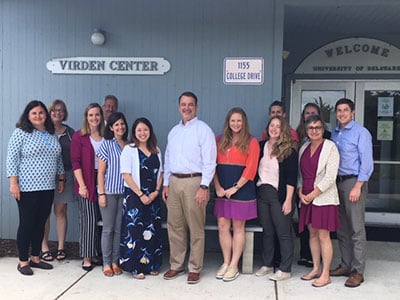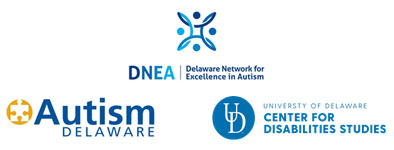New Initiative to Improve Autism Diagnosis and Evaluation Commences for Professionals (DE UCEDD)
July 8, 2019

|
| Delaware stakeholders and experts from the University of Missouri Thompson Center for Autism and Neurodevelopmental Disorders met in Lewes June 24-25 to discuss best-practice guidelines for autism evaluation and diagnosis. |
Experts and other stakeholders in the Delaware autism community are taking action to improve diagnostic practices for autism, which has risen in prevalence by 80 percent in Delaware over the last decade. Delaware-specific guidelines will be created to ensure that diagnostic evaluations are informed by research and incorporate local resources and services. The process began with two days of training and workshops hosted by the Delaware Network for Excellence in Autism (DNEA) on June 24-25 at the Virden Center in Lewes. The events were led by Dr. Stephen Kanne, the executive director of the University of Missouri Thompson Center for Autism and Neurodevelopmental Disorders, a nationally known expert on diagnosis of ASD.
Participating in a full-day workshop on the diagnostic evaluation process were specialists in neurology, psychiatry, psychology, speech-pathology and counseling, as well as a panel of family members who described their experiences receiving a diagnosis for their child - what went well, and what didn't. "As a parent of a child who has difficulty expressing herself, I've worked really hard to become her voice," said Stephanie Kaznica of Hockessin, the mother of a five-year-old with autism who participated on the family panel. "I am truly hopeful that Delaware families can soon get the evaluations and services they need much earlier."
A group of stakeholders, including Nemours/AI duPont Hospital for Children, the DNEA, the University of Delaware, Autism Delaware, the Delaware Division for Prevention and Behavioral Health, and the Delaware Department of Education, took part in a strategic planning discussion, facilitated by Dr. Kanne, on the creation of Delaware-specific guidelines for evaluating and diagnosing autism spectrum disorder. "We had a very productive two days. There is tremendous enthusiasm in Delaware for creating more efficient and effective diagnostic processes for children with ASD," said Emily Bernabe, PhD, BCBA, Clinical Director of Psychology for the Swank Autism Center at Nemours/AI duPont Hospital for Children.
The group identified specific next steps including reviewing other states' guidelines, establishing an expert panel, and connecting with leaders, families, and practitioners from across the state. "We need more specialists in Delaware who utilize scientifically-based practices when assessing autism. Delaware-specific guidelines will lay out a clearer process for practitioners and help them understand the resources and services available in our state," said Dr. Brian Freedman, interim director of the DNEA and associate director of the University of Delaware's Center for Disabilities Studies, which houses the DNEA. "We were thrilled to host experts from the Thompson Center and take these critical next steps."
Individuals, groups or agencies interested in being part of this initiative should contact Brian Freedman at the Delaware Network for Excellence in Autism at (302) 831-4688, [email protected].
About the DNEA, Autism Delaware and autism spectrum disorder (ASD)
ASD is a developmental disorder that includes impairment in social interaction and social communication. Individuals with ASD also exhibit repetitive patterns of behavior or interest that limit everyday functioning. An intellectual or language impairment is also possible. All these symptoms first appear in early childhood.
Autism has been on the rise nationally and the Centers for Disease Control and Prevention (CDC) estimates that one in 59 children in the U.S. under the age of eight is on the autism spectrum. Delaware has not been immune to this trend: the number of students receiving an educational classification has risen from 152 in 1991-1992 to 2,357 in 2018-2019. Of note, this number does not capture the adults and children who are not currently being served by the schools' special-education system.
The Delaware Network for Excellence in Autism (DNEA) offers training, technical assistance, and information dissemination to community agencies, organizations and those directly impacted by autism spectrum disorder (ASD). To learn more about technical assistance and professional training opportunities sponsored by the DNEA or submit requests for specific training topics, contact the DNEA at: [email protected]; http://www.cds.udel.edu/autism-initiatives/dnea/.
Autism Delaware is a private statewide agency that provides resources and support to individuals and families affected by ASD. Its programs and services are supported by state contracts and generous donations from individuals and corporations across Delaware. More information is available at www.autismdelaware.org.
Photo Caption:
Delaware stakeholders and experts from the University of Missouri Thompson Center for Autism and Neurodevelopmental Disorders met in Lewes June 24-25 to discuss best-practice guidelines for autism evaluation and diagnosis.








